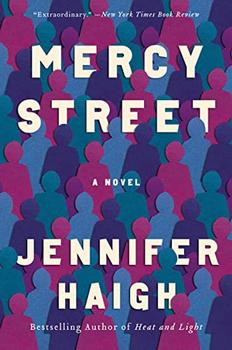Summary | Excerpt | Reviews | Beyond the Book | Readalikes | Genres & Themes | Author Bio

A Novel
by Jennifer Haigh
An AB. That's what they called it. Whenever possible, they avoided saying the word.
Her predecessor in the job was a woman named Evelyn Dodd, who did it for twenty years before suffering a series of ministrokes and quitting for good. How she lasted that long was a mystery for the ages, because Access was stressful. Claudia liked the minors and didn't mind the medicals, but the latecomers cracked her open. In Massachusetts, AB was illegal after twenty-four weeks. When a patient terminated at the last minute, it was usually because she'd gotten ominous test results: a fetal brain tumor, a mass in the lung.
The latecomers were impossible to counsel, because they didn't want ABs. They wanted babies. They were pregnant by choice; some had gone to great lengths, and considerable expense, to get that way. Many were over forty, painfully aware that this was their last chance. By the time Claudia met them, they were mortally exhausted, like prisoners who'd been waterboarded. Some wept. Others were catatonic. A few were incandescently angry. None of these reactions surprised her. She was meeting them on the worst fucking day of their lives.
By week twenty-three, names had been chosen, cribs purchased, baby showers planned.
Minors were easier. First Claudia saw the girl alone. Then she met with the parent or legal guardian, who signed the consent form. To get an AB in Massachusetts before age eighteen, you needed a parent's permission, unless you happened to be married. In the eyes of the Commonwealth, having a husband made you an adult.
The consent form had to be signed in person. This made things difficult if the parent was missing or incarcerated or deployed overseas, unable to jet back from Afghanistan to sign a piece of paper. In other cases, parents were available, but—for one reason or another—the girl refused to tell them she was pregnant. For these patients, Massachusetts law provided an additional, equally shitty option: a judicial bypass, an order signed by a judge.
For one reason or another. For some girls, home was a dangerous place.
Getting a JB wasn't easy. Not every teenager had the sangfroid to stand before a judge—who was nearly always old, White, and male—and beg for permission to do as she wished with her one and only life. And yet, faced with the prospect of confiding in their own parents, a surprising number would rather tell it to a judge.
JBs were usually sixteen or seventeen. That isn't to say that younger girls didn't get pregnant, just that they were unlikely to pull themselves together to appear before a judge.
With some judges, the interview was a formality. Others asked probing questions: the girl's career and educational goals, her reasons for terminating, whether she'd been pregnant before, what form of birth control she planned to use in the future. Really, they could ask whatever they wanted, and none of your fucking business was never an acceptable answer.
Important note: younger girls did get pregnant. Depending on where and how and with whom she lived, a thirteen-year-old girl in America had, by Claudia's estimate, a medium to high chance of being messed with.
With the JBs she restrained herself. She resisted the urge to mother them, to scold and lecture: Stay in school. Protect yourself. Choose the future over the present. Leave nothing to chance. It was the only way—if you were born female, and especially if you were poor—to own your own life.
Claudia said none of these things. Instead she found them attorneys (at no cost to the patient—the lawyers were paid by the Commonwealth). Once a court date was set, she arranged transportation to the courthouse, a note from Dr. Gurvitch to explain the girl's absence from school. Then she prepped the patient for her interview with the judge.
Sometimes the patient resisted. A few years back, she'd prepped a JB whose career goal was to play in the WNBA. Claudia wasn't sure that would fly with the judge, so she suggested talking about other things—the patient's part-time job at Lady Foot Locker, the possibility of community college. But Ana F.—a gorgeous Dominican girl from Dorchester, lanky as a supermodel—wouldn't have it. She sat impassively in Claudia's office, her long arms folded across her chest.
Excerpted from Mercy Street by Jennifer Haigh. Copyright © 2022 by Jennifer Haigh. Excerpted by permission of Ecco. All rights reserved. No part of this excerpt may be reproduced or reprinted without permission in writing from the publisher.




If there is anything more dangerous to the life of the mind than having no independent commitment to ideas...
Click Here to find out who said this, as well as discovering other famous literary quotes!
Your guide toexceptional books
BookBrowse seeks out and recommends the best in contemporary fiction and nonfiction—books that not only engage and entertain but also deepen our understanding of ourselves and the world around us.